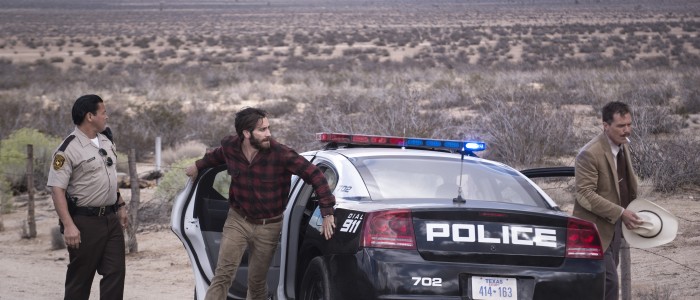Let's Talk About The Ending Of 'Nocturnal Animals'
Tom Ford's Nocturnal Animals hit theaters this past weekend and while /Film's Angie Han found it "pretty but hollow," the film continued to haunt me long after I left the theater.
Specifically, I found the film's ending to be enigmatic, and worthy of further conversation. After the jump, you'll find some of my thoughts on it. You should assume that there are massive SPOILERS for the film in this article and in the comments.
Nocturnal Animals cuts back and forth between several narratives. In the main time period, Susan (Amy Adams) is living in an unhappy marriage and unsatisfied with the art she's putting out into the world (side note: the opening credits sequence of the film gives us a window into the work displayed at Susan's gallery — a striking, ironic celebration of American excess and freedom). When a book titled Nocturnal Animals hits her doorstep from her ex-husband, Edward Sheffield (Jake Gyllenhaal), Susan quickly reads it until its conclusion.
In gripping fashion, the movie recreates the events of the book's plot, with Gyllenhaal also playing Tony Hastings, a man whose wife and child are brutally murdered, leading to a quest for revenge against the perpetrators. While Hastings eventually kills the man responsible, he ends up injured. While Hastings crawls away from the site where he exacted revenge, he shoots himself by accident. Meanwhile, we also see flashbacks to Susan's first meeting with Edward, her failed marriage with him, and the abortion she had of his child after she left him for another man.
The film ends with Susan emailing Edward to set up a dinner meeting at a restaurant. Susan meticulously adjusts her appearance before heading out. She waits at the restaurant for hours. Edward never shows up. We cut to end credits. What does it all mean?
On a basic level, I think it's clear that Edward's book is about his marriage to Susan. The murder of Hastings' wife and child, Laura and India respectively, signify Edward's wrenching grief at how his own wife and child were taken away from him. In Edward's eyes, when Susan left him, she did so mercilessly. She never appreciated his work, never gave their marriage a chance, and then aborted their child while trying to keep him in the dark about it. For Edward, these events were as traumatic as a double murder. But the end of the book is Edward saying goodbye to his past self and deciding to move on.
The events of the film Nocturnal Animals are all about Edward's revenge on Susan. The first stage of it is to create something brilliant in the face of his ex-wife's lack of faith. Many years after their marriage, Edward has emerged from obscurity with a book that Susan describes as "violent and sad." To the audience experiencing the book onscreen, it's chilling and Hitchcockian. I was enthralled with every aspect of the Hastings saga, from the initial scenes that tragically rise to a boil, all the way to the way Texas lawman Bobby Andes (Michael Shannon) deals with the criminals towards the end. It's brilliant filmmaking that recalls the best of the Coens and I was in awe that Tom Ford was able to deliver something at this level for his second film outing.
But what of the film's ending? After all that we've seen, how is standing Susan up for a date supposed to be satisfying in any way?
I think it's to signify that Edward just does not give a damn about Susan anymore. We have no idea if Edward knows about Susan's unhappy life situation (if he does, then his revenge is all the more punishing). But he does likely know that his book Nocturnal Animals is a hit, and that that talent and brilliance is something Susan will be attracted to. So he dangles in front of her the opportunity to meet again and possibly rekindle old flames, only to allow her to come to the slow realization that he never intended to show up. Elie Wiesel once said, "The opposite of love is not hate, it's indifference." Thus, the film's ending is a much more hurtful form of revenge than anything Edward could actively do to hurt Susan.
In an interview on Jeff Goldsmith's Q&A podcast, writer/director Tom Ford affirms this interpretation:
Does he not show up as an act of revenge, or does he not show up because he just literally can't face her? [The ending] seems the correct conclusion to me, because she falls in love with him again through reading [the novel]. She is liberated, by the way, at the end. This has been painful. She's taken those rings off. She's wiped off that lipstick, and she is not going back to that life. We don't know what the next chapter is for her, but [the previous] chapter is over.
One Alternate Theory
There's an alternate theory floating around out there that Edward actually kills himself at the end, and that this is his final act of revenge on Susan. In this theory, his suicide is why he doesn't show up at the dinner. The rationale for this is that since Hastings kills himself in the book, Edward probably killed himself in real life.
I think this is a pretty far-fetched idea. The biggest piece of evidence against it is that he replied to Susan's email after she asked him to set up a meeting (so did he wait to set up the meeting, THEN kill himself?). But also significant is the fact that the events of the book aren't meant to have a 1:1 correlation with real-life occurrences. The book is Edward's primal scream, working out his complex feelings around betrayal and having his life upended. It's not necessarily a road map to how he is going to behave now that the book is completed. Thus, the theory isn't completely out of the question, but it's not my interpretation of events.
Overall, Nocturnal Animals is a unique film that requires an exceptional amount of skill to pull off successfully. If the plotline involving Hastings' family had been poorly executed, it would have been much more challenging to invest in any of the film's emotional stakes. As it stands, I think Tom Ford threaded that needle and created a film worth your attention.


